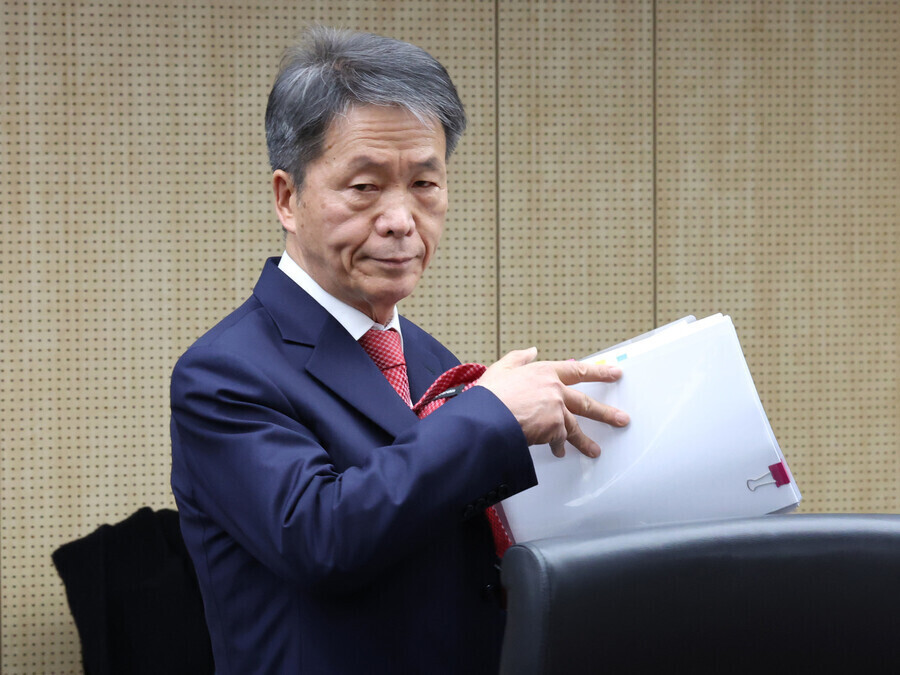hankyoreh
Links to other country sites 다른 나라 사이트 링크
[Editorial] How could a person charged with protecting human rights dismiss sexual slavery?

The statement was made at a meeting of the commission’s plenary committee that was being held to deliberate the content of a report slated to be submitted to the UN Committee on the Elimination of Discrimination against Women (CEDAW).
Kim was essentially refuting the need for the South Korean government to call for a formal apology and legal reparations from Japan regarding victims of sexual slavery under the imperial Japanese military.
It is unthinkable for a human rights commissioner to voice such ridiculous sentiments.
Not only are the Japanese military’s atrocities against women recognized as crimes against humanity and uncontested historical truths, but several courts have confirmed Japan’s legal responsibility for compensation.
In 2021, the lawsuit for damages against the Japanese government filed by victims and surviving family members was finalized, and at the end of 2023, the court repeatedly recognized the Japanese government’s responsibility for damages.
Nevertheless, the Japanese government has not made any sincere efforts to resolve past historical issues, and the Korean government has been groveling whenever it comes to diplomacy with Japan.
Under such circumstances, calling on the Japanese government to apologize and provide legal reparations is the bare minimum expected of the South Korean government.
When CEDAW Women conducts a review of the South Korean government this coming May, it is only right that this demand be included in its report. In its 2016 review of Japan, CEDAW also recommended that the Japanese government, “recognize[s] the right of victims to a remedy, and accordingly provide full and effective redress and reparation, including compensation, satisfaction, official apologies and rehabilitative services.”
However, Kim stated, “The international order is divided into blocs, with North Korea, China, and Russia forming one bloc. Japan is a much-needed ally for us to counter those forces,” and objected to the statement’s inclusion in the report. He was joined by Lee Choong-sang, another standing commissioner of the NHRCK.
Using the current geopolitical situation to cover up horrific human rights abuses is an act that goes against the protection of human rights. Not only is this damning in the eyes of the public, but it is unthinkable that such statements came from a key member of the nation’s human rights commission, whose primary responsibility is to defend human rights.
Three out of the NHRCK’s 11 members are permanent members. Kim was appointed as a permanent member by the president, and Lee was recommended by the ruling People Power Party.
The two commissioners have received complaints from various human rights organizations and were reported to the Anti-Corruption and Civil Rights Commission. The fact that the permanent members of the NHRCK, who should act as the backbone of the commission, display such disappointing behavior is absolutely deplorable.
Please direct questions or comments to [english@hani.co.kr]

Editorial・opinion
![[Column] Season 2 of special prosecutor probe may be coming to Korea soon [Column] Season 2 of special prosecutor probe may be coming to Korea soon](https://flexible.img.hani.co.kr/flexible/normal/500/300/imgdb/original/2024/0426/3317141030699447.jpg) [Column] Season 2 of special prosecutor probe may be coming to Korea soon
[Column] Season 2 of special prosecutor probe may be coming to Korea soon![[Column] Park Geun-hye déjà vu in Yoon Suk-yeol [Column] Park Geun-hye déjà vu in Yoon Suk-yeol](https://flexible.img.hani.co.kr/flexible/normal/500/300/imgdb/original/2024/0424/651713945113788.jpg) [Column] Park Geun-hye déjà vu in Yoon Suk-yeol
[Column] Park Geun-hye déjà vu in Yoon Suk-yeol- [Editorial] New weight of N. Korea’s nuclear threats makes dialogue all the more urgent
- [Guest essay] The real reason Korea’s new right wants to dub Rhee a founding father
- [Column] ‘Choson’: Is it time we start referring to N. Korea in its own terms?
- [Editorial] Japan’s rewriting of history with Korea has gone too far
- [Column] The president’s questionable capacity for dialogue
- [Column] Are chaebol firms just pizza pies for families to divvy up as they please?
- [Column] Has Korea, too, crossed the Rubicon on China?
- [Correspondent’s column] In Japan’s alliance with US, echoes of its past alliances with UK
Most viewed articles
- 1‘We must say no’: Seoul defense chief on Korean, USFK involvement in hypothetical Taiwan crisis
- 2Is Japan about to snatch control of Line messenger from Korea’s Naver?
- 3Division commander ordered troops to enter raging flood waters before Marine died, survivor says
- 4[Editorial] Korea’s surprise Q1 growth requires objective assessment, not blind fanfare
- 5[Column] Season 2 of special prosecutor probe may be coming to Korea soon
- 6[Special report- Part III] Curses, verbal abuse, and impossible quotas
- 7Flying “new right” flag, Korea’s Yoon Suk-yeol charges toward ideological rule
- 8[Guest essay] The real reason Korea’s new right wants to dub Rhee a founding father
- 9[Column] ‘Choson’: Is it time we start referring to N. Korea in its own terms?
- 10[Column] Park Geun-hye déjà vu in Yoon Suk-yeol